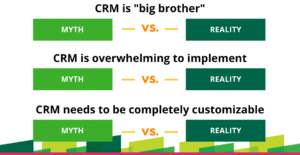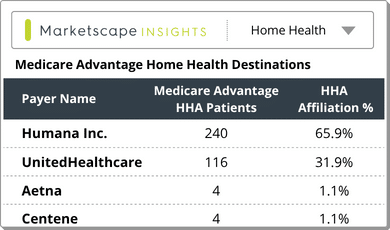As post-acute organizations look for ways to streamline their sales processes, manage referral source relationships, and look for new growth avenues, Customer Relationship Management (CRM) platforms have become increasingly popular.
However, with more organizations implementing a CRM platform, numerous myths, and misconceptions can lead organizations down the wrong path.
From concerns about completely customizing the platform to sales reps worrying about the platform “spying” on them, many myths about CRMs can hinder a post-acute organization’s success.
In this article, we’ll debunk three common myths about CRMs to give your organization insight into choosing the right CRM.
Understanding the truth behind these misconceptions is essential to help your team connect with the top referral sources and succeed.

Myth #1: CRM Is Big Brother
“They just want to track my activity and see what I’m doing … talk about big brother!”
Any sales leader who has been in sales long enough has heard the above saying countless times.
While activity tracking is undoubtedly part of what a CRM does, a modern CRM can do so much more.
The Reality
When integrated and adopted into your business process correctly, the primary function of a CRM is to help your organization better serve your referral partners, which can lead to stronger relationships and overall success.
If it’s helping to drive relationships and referrals forward, it ultimately drives success for your sales reps.
As we all know – if it’s not beneficial for your reps, it won’t be fully adopted.
A CRM is not meant to monitor employees but focuses on customer interactions – and the data collected within can help your reps gain valuable insights, visibility, and guidance to help them be more productive in the field.
For instance, with a CRM, your team can quickly access their:
- Calendar
- Appointments
- Notes
- Referral information
- Market Insights
When a rep is at a physician’s office or hospital, they can get a quick refresher regarding the latest encounters with that account and access market insights to deliver a data-driven conversation (as done in Trella Health’s Marketscape). This efficiency helps instill confidence and builds upon previous discussions.
A great CRM can help sales reps become “clinically connected,” with quick access to patient updates – which can help highlight your commitment to better outcomes for their patients. In addition, this helps strengthen your reps’ relationships with their targeted referral sources.
To further combat the “big brother” myth, encourage your sales reps to provide feedback on the CRM and involve them in the implementation process. This can help them feel more comfortable and understand the software’s benefits.
While a CRM can provide visibility for sales leaders, it should ultimately be a tool that makes your team’s lives easier. By providing them with a great CRM and involving them in the process, you can help them be more productive, efficient, and successful.
A CRM can be just as beneficial to a sales rep as it is to their business leaders.
Myth #2: A CRM is overwhelming to implement
We all have limited time and resources, especially with staffing being a big concern for the post-acute industry in the last few years. As a result of this headwind, everyone must figure out how to do more with less.
Most people believe a CRM will take significant time to implement, and the organization can’t take on a new project.
Sales leaders worry that sales reps will need more time to train on a new system – or they need more confidence in implementing a CRM and can be afraid of doing it wrong and not having reps utilize it.
The Reality
The reality is that your current process might already be overwhelming – the goal of a CRM is to simplify things.
It’s okay to start small. To avoid overwhelming your organization, start with the most critical functions.
For example, from the leadership standpoint, a sales manager can organize account territories and assign reps to get started.
From there, the sales manager can create a daily and weekly activity structure for their team. This will help your team use the CRM and develop familiarity with the new software.
As you build out additional processes, continue to involve your team to help them feel invested and increase buy-in. Help set goals regarding what you want to achieve with the software and communicate it to the reps.
As you continue to scale and increase the adoption of the CRM, create a training program that covers all the features and functions they will need to use in their daily work. This will also help with onboarding in the future to allow new reps to get up to speed faster.
Choosing the right CRM vendor, especially one specializing in your industry, can help alleviate complexities specific to your business and allow you to get up to speed much faster.
Additional Resource: Want to learn how to select the right CRM for your post-acute organization? Read here.
Once you’ve picked a partner, you’ll need to dedicate an employee to managing the project and overseeing the CRM once implemented.
Choosing a partner can be overwhelming and take up valuable time, leading to some organizations delaying using a CRM, but don’t let that fear hold you back.
With the right approach, an industry-specific CRM, and a trusted vendor, your sales team can do more with less and efficiently achieve their goals.
Myth #3: A CRM needs to be completely customizable
Many organizations believe that all CRMs must be completely customizable to fit all their business needs and will be too difficult to use.
Although it sounds helpful having the ability to customize every aspect of your CRM, a post-acute provider might need something already tailored to their needs.
Unfortunately, customizing a big-box CRM platform will require you and your team to have lengthy conversations with third-party vendors to explain your business processes and workflows to ensure it expands across the business.
The Reality
Most large-scale CRMs are one-size-fits-all because they can be customizable to any organization. However, this broad approach can lead to many features that must be modified to be utilized in post-acute care.
In addition, big-box CRMs are built for many aspects of an organization, such as marketing, sales, operations, and finance. However, most agencies don’t need a CRM that fits across multiple departments since that’s really what the EHR is doing – beginning with the intake process.
While a blank slate and fully customizable CRM is excellent for certain businesses, most agencies need something for their sales and marketing teams. In addition, for a healthcare sales team, the CRM should be tailored to be mobile-first since post-acute reps spend most of their time in the field.
As mentioned above, exploring an industry-specific CRM with a vendor who understands your specific workflows is recommended in the post-acute space. While it still requires implementation time, onboarding should be seamless.
As a sales leader, by explicitly understanding your team’s needs and considering an industry-specific CRM, you can have the CRM you always wanted without the headache of extensive customization.
Picking the right CRM for you
When choosing a CRM for your organization, separating the myths from reality is essential.
While some believe that CRMs are challenging to implement or act like a “big brother,” a great CRM can be a valuable tool for your sales team. To get the most out of a CRM, choose one that fits your organization’s needs and involve your sales reps.
Doing so can overcome common myths and set your team up for success.














